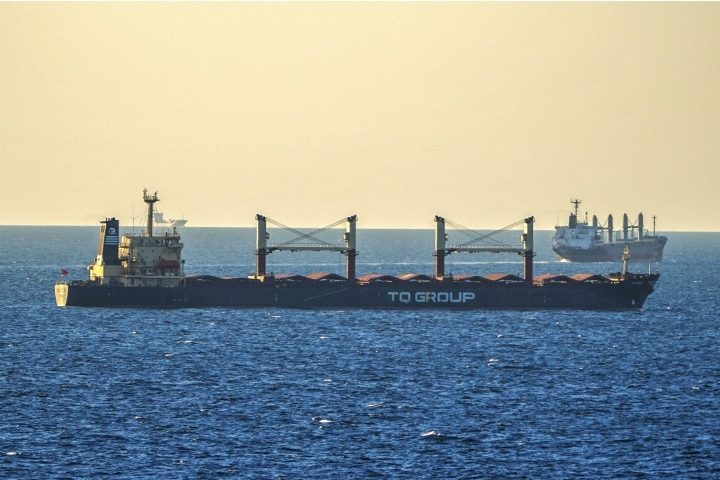
Russia has announced its withdrawal from the Black Sea Initiative that enabled millions of tonnes of grain and other foodstuffs to leave Ukraine’s ports notwithstanding the ongoing Russo-Ukrainian conflict that began in February 2022.
The deal, co-signed by Russia, Türkiye, and Ukraine, would have had its one-year anniversary on July 22.
For the moment, it will not be extended, according to Kremlin spokesman Dmitry Peskov’s statements to reporters. “Unfortunately, the part of the Black Sea agreement that concerns Russia has not yet been fulfilled. As a result, it has been terminated,” he said, adding that “as soon as the Russian part [of the deal] is fulfilled, the Russian side will immediately return to the implementation of this deal.”
Russia had threatened to leave the initiative several times because its requests for the lifting of sanctions on its logistical and financial sectors, which obstructed its grain and fertilizer exports, had not been fulfilled.
When questioned if Ukraine’s assault on the Kerch bridge, which links the Crimean peninsula to the Russian mainland, impacted Moscow’s decision, Peskov replied that Russia’s suspension of the grain deal was prior to the assault, the latter which Moscow slammed as a “terrorist act.”
Two people were killed and another injured on July 17 in what Ukrainian security services, SBU, claimed was an attack staged by its troops to undermine the use of the Kerch Bridge, a strategic 19-kilometer bridge.
Russia’s Antiterrorism Committee accused the Ukrainian special services, abetted by America and the U.K., of using unmanned drones on the water’s surface to stage the assault. At first glance, the blasts seemed to have resulted in significant damage to one of the bridge sections, leading to the partial destruction of a section of the roadway segment of the bridge.
Moreover, a source in the SBU confirmed to AFP that the Ukrainian special services and naval forces using unmanned naval drones indeed conducted the attack.
“Tonight the terrorist regime in Kyiv committed a new crime — it attacked the Crimean bridge,” Vladimir Konstantinov, the head of the State Council of the Republic of Crimea, said.
“The railroad track was not damaged by the strike,” Konstantinov added, elaborating that the bridge’s support columns remained intact after the blasts.
Around 24 hours after Ukraine’s attack on the Kerch bridge, Russian kamikaze drones and cruise missiles pelted the Black Sea port of Odessa, Mykolaiv, and elsewhere, in what the Russian Defense Ministry called a “massive revenge strike,” following Moscow’s termination of the grain deal.
Attempted strikes on targets in the eastern regions of Donetsk, Kharkiv, and Dnipropetrovsk have also been allegedly carried out.
Russia’s defense ministry penned: “The armed forces of the Russian Federation carried out a mass retaliatory strike overnight using precision sea-based weapons against facilities where terrorist acts against the Russian Federation were being prepared using uncrewed boats.”
The ministry claimed that the precision strikes targeted a ship repair plant near Odessa where boats were being built. “In addition, storage facilities holding around 70,000 tons of fuel used to supply the Ukrainian military’s equipment were destroyed,” the ministry posited, maintaining that all targets had been successfully hit and destroyed.
The Ukrainian military’s Southern Command said that its air-defense systems intercepted six Kalibr cruise missiles “launched from the waters of the Black Sea at Odessa,” and twenty-one Iranian-made Shahid 136 drones, also referred to as “kamikaze drones,” as they approached Odesa’s coastline from the sea.
“Unfortunately, the debris of the downed missiles and the blast wave from the downing damaged the port infrastructure facilities and several homes,” the military pointed out.
The Odessa region in southern Ukraine, roughly 300 kilometers from the Crimean peninsula, has been a frequent target of assaults since February 2022.
In the southern port city of Mykolaiv, some 170 kilometers from Crimea, local governor Vitali Kim affirmed that an “industrial facility” had been damaged during the overnight airstrikes carried out by Russia.
Referencing the overnight airstrikes, Andriy Yermak, the head of Ukrainian President Zelensky’s staff, said they were “further proof that the country-terrorist wants to endanger the lives of 400 million people in various countries that depend on Ukrainian food export.”
Both Russia and Ukraine provide over a quarter of the world’s wheat, sunflower oil, and barley, and developing nations have been highly dependent on their supplies.
Western officials have criticized Russia’s move to terminate the grain deal. UN Secretary-General Antonio Guterres, for one, told reporters that the move would “strike a blow to people in need everywhere.”
“Hundreds of millions of people face hunger and consumers are confronting a global cost-of-living crisis. They will pay the price,” he said.
EU Commission President Ursula von der Leyen posted on Twitter to “strongly condemn” what she called “Russia’s cynical move to terminate the Black Sea Grain initiative” before pledging that the EU would strive to continue bringing “agrifood products out of Ukraine and to global markets.”
Ukraine has been hailed as “the world’s breadbasket,” and its food exports have been regarded as necessities. Ukraine has cautioned that it could target all shipping out of Russian and Russian-occupied ports and indicated its readiness to combat Russia on the matter of the Black Sea.
The defense ministry in Kyiv published a statement saying that from midnight on Thursday, all shipping plying Russian-held ports “may be considered by Ukraine as such carrying military cargo with all the associated risks,” ominously echoing a similar threat from Moscow on Wednesday against all ships using Ukrainian ports.
“The fate of the cruiser Moskva proves that the defense forces of Ukraine have the necessary means to repel Russian aggression at sea,” the ministry said, alluding to the sinking of the flagship of Russia’s Black Sea Fleet last year.
In mid-November in 2022 the grain deal agreement was extended by four months, while in May, the agreement was extended by another 60 days.
Meanwhile, Kyiv has been grappling to find ways to market its exports, with one option seemingly calling on Ankara for help. However, Türkiye is unlikely to adopt such “a highly risky move,” based on an official familiar with the matter who spoke with a U.S. newspaper, a Sputnik news report claimed.
Dmitry Skornyakov, CEO of Ukraine’s HarvEast Holding, one of Ukraine’s largest agribusiness corporations, said that “the main task for Ukraine now is to get the support of Türkiye.”
Ukrainian President Volodymyr Zelensky has appealed to the Turkish president to extend the grain deal without Russia, urging Ankara and the UN to “ensure the work of the food corridor and the inspection of ships” themselves.



